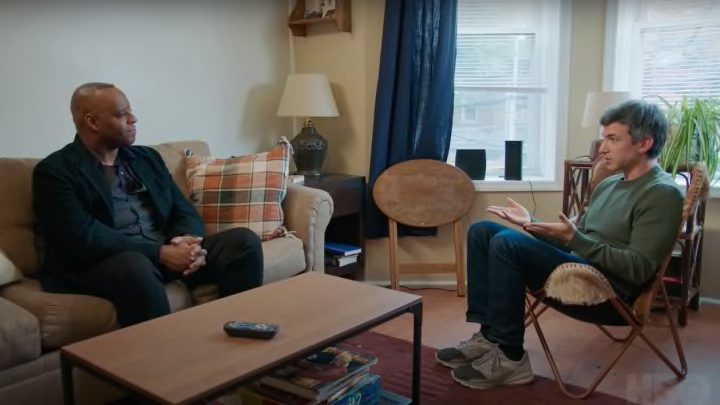Weird television darling Nathan Fielder has finally made the big time. After expanding his following as the star of Comedy Central’s Nathan for You from 2013 to 2017, a comedy reality series in which he attempts to help real struggling business owners through increasingly bizarre business tactics—staging a viral video to attract visitors to a zoo, recruiting employees for a moving company by marketing the job as a workout plan, commissioning the creation of an elaborately rigged fat suit to secretly dispense chili to fans at hockey games, etc.—he inked a deal with HBO that enabled him to serve as executive producer on the similarly bizarre How To with John Wilson, and to create a series of his own. Now, three years after the deal was struck, Fielder has delivered The Rehearsal to sweeping critical acclaim, earning him glowing reviews from Time, Entertainment Weekly, The New York Times, Rolling Stone, and a host of other publications.
“The Rehearsal” is a documentary-style comedy series that again sees Fielder lending real people a helping hand. This time, instead of being anxious about sales figures, the show’s participants are anxious about upcoming decisions and life events, and enlist him to help them rehearse their actions before the big day. Fielder performs this task with appalling vigor, creating a new universe in microcosm each time one of his clients has to have an uncomfortable conversation with someone. In the pilot episode, he helps a bar trivia fanatic who’s been lying to one of his teammates about his education history for over a decade. To help him build the confidence to come clean, Fielder and his team construct a perfect replica of the bar the conversation will take place in, hired an actor to play the teammate, and

several more to populate the bar. The replica nails details as minute as a deflating party balloon trapped on the bar’s ceiling, because of course it does.
Fielder exhausts a tremendous amount of resources in his worldbuilding process, which could very well be why the first season consists of only six episodes. HBO may be loaded, but “The Rehearsal” does about all it can to push them to the brink of insolvency. If he’s not building a one-to-one replica of a bar inside a warehouse, he’s devising an unbelievably meticulous and expensive plan to give a single woman a realistic taste of what motherhood is like. This requires Fielder to rent a farmhouse in Oregon, hire several child actors of varying ages, instruct his team to switch the actors out at four-hour intervals to keep from violating Oregon child labor laws, and, because his client is meant to raise the child from birth to eighteen in just a few months, simulate the passage of time in creative ways, such as exchanging planted garden vegetables for fully grown ones in the dark of night, and installing digital mirrors that make their users appear older.
The idea for “The Rehearsal” was born out of Fielder’s experiences taping “Nathan for You.” Because of the inherent volatility of human subjects, Fielder found himself attempting to plan for every possible twist and detour that could occur during the show’s segments. He wanted, plainly, to successfully expect the unexpected. “The Rehearsal” represents both the futility and furthest reaches of that desire. Though Fielder knows you can never truly plan for everything, “The Rehearsal” functions as a study of just how much you can plan for. Unlike other shows where participants enlist a guru for their services—”Iyanla, Fix My Life,” “Property Brothers” and the like—clients of “The Rehearsal” are being promised something everyone wants and no one can obtain: control.
Everyone on “The Rehearsal”—including Fielder, as he hires actors to help himself rehearse on multiple occasions—wants to control their fate. They want to believe that enough flowcharts, number-crunching and line-running will not only prepare them for the future, but will bend the future to their will. There is no time in recent memory when this fantasy was more attractive.
The ability to expect the unexpected is not just invaluable, but practically mythological in an age where the unexpected is all we’ve come to know. Some might initially judge the show’s subjects as desperate or delusional, but how different are they from us? Don’t we all aspire to the peace of mind that they seek?
Whether by design, rehearsal, or nothing of the sort, Fielder’s latest creation comes at the perfect time. Between its sometimes funny, sometimes profoundly uncomfortable moments, it finds the space to be one of the most timely and daring shows on television, and its only getting started.


